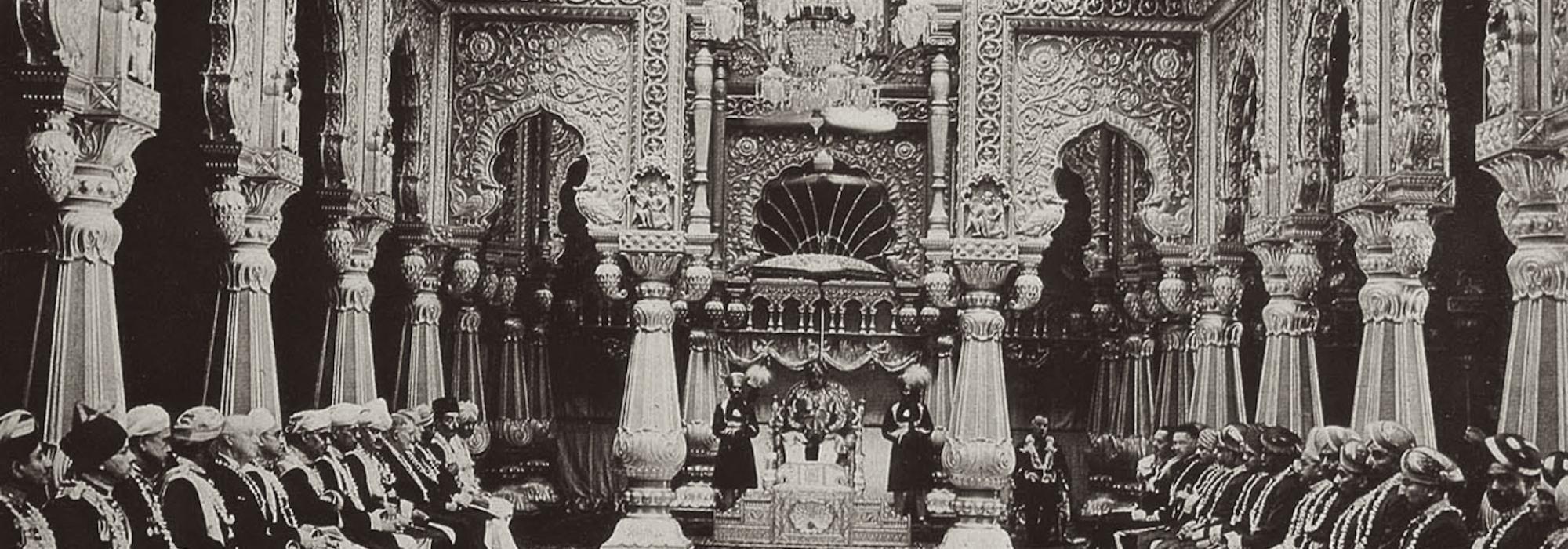Virūpākṣa-śāstrī
Everyone agreed to that [conditions laid down by Seshadri Iyer’s wife]. Seshadri Iyer himself, very cheerfully, agreed to all of it. According to the agreement, to deliver discourses on the Purāṇas, they appointed Hānagal Virūpākṣa-śāstrī. He had been a student of the Saṃskṛta Pāṭhaśālā during his early days and with the passage of time, rose to prominence as ‘Vidyānidhi’ and ‘Mahāmahopādhyāya.’
Every afternoon, while Virūpākṣa-śāstrī narrated episodes from the Purāṇas in the living room of Kumara Bhavana, Seshadri Iyer would come downstairs, sit down for around fifteen minutes or half an hour, and listen. After a few days of this routine, Seshadri Iyer wrote a glowing letter recommending Virūpākṣa-śāstrī to the Śṛṅgeri Sannidhānam, in which he mentioned that such a great scholar deserved the encouragement of the jagadguru’s proximity. The jagadguru approved it. This created an opportunity for Virūpākṣa-śāstrī, who had become, by then, an authority in Tarka-śāstra (Logic) and had earned the title ‘Tarka-pañcānana,’ to begin teaching Vedānta-śāstra in the guru-sannidhi (presence of the teacher).
‘Rājya Dhurandhara’
The title that the Mahārāja bestowed upon Seshadri Iyer was, in reality, not a mere title but an actual fact. Just as the term ‘Rājya Dhurandhara’ is full of the sentiment of majesty and dignity, it is also a fitting tribute to Seshadri Iyer’s accomplishments in work. In the English language, there are three words in use that describe the standard of public servants – 1. Politician, 2. Administrator, and 3. Statesman.[1] Of the three, a politician is someone who dabbles in all kinds of political activities. He is not accountable to anyone. A politician takes on various avatars such as chanting slogans on the street, conspiring in a closed room, knowing the pains that have afflicted the hearts of the people, familiar with the stunts that can stir up the hearts of people, screams, ostentation, the façade of humility, strategy, threats, and so forth. For him, this is a mere vocation. The politician treads the path trodden by doctors and lawyers in their chosen professions to achieve personal gains – hustle, conspiracy, scheming, publicity, and so on. In a democracy, a politician’s vocation achieves prosperity. It is a kind of business.
An administrator is of a higher standard than the kind of person described previously. He has responsibilities that are clear and well-defined. He has people both above and below him. The officials above him would have made his duties clear. Getting those below him to perform those duties is the administrator’s responsibility. He has to discharge his duties within the rules and legislations of the State. If the State is a human body, he is like the bones. The heavy and significant parts are carried by him.
A statesman is of a higher grade than an administrator. The word ‘statesman’ is considered to have great weightage, and hence, it is used to describe only a handful of people who have successfully rendered public service. There are four distinct qualities of a statesman –
1. Amongst hundreds of actions a State would require, a statesman will make it clear to himself as to what is possible for him to undertake.
2. He will plan his duties based on an order of priorities. He never pushes a task of first priority to second place. And he does not bring a task that can wait for some time to first place. Gaining wisdom of such important and peripheral tasks is a challenge in itself.
3. Even to perform the duties considered most necessary, he will think about the aptness of time. Are the time, place, and present situation suitable to begin the work? When is it appropriate to begin a certain task? What kind of place and situation are convenient? Without evaluating such criteria, one cannot take up a task on whim.
4. Practical Wisdom: He considers the availability of financial and human resources to accomplish a great project. How to strengthen something that is weak? How to stabilize over-enthusiasm? How to make the uninteresting exciting? How to bind your opponents so as to make sure they don’t open their mouths? Who should be unleashed against whom? How to earn what from where? Such clever and strategic thought process is at the heart of statesmanship.
Seshadri Iyer had all these four qualities. That was the reason he won the deep admiration of a critic as severe as Lord Curzon. In Europe, Bismarck[2] and Cavour[3] were the only two who had rose to fame as able statesmen. Just like Mysore, the states of Prussia and Naples were small provinces. However, those two States had the freedom to sign treaties or wage wars with other States. Making use of those opportunities, Bismarck and Cavour conspired with the neighboring states, expanded their kingdoms, and lifted them up. Had Mysore been given such an opportunity, Seshadri Iyer had the statesmanship enough to have used it for the welfare of the Kingdom of Mysore – this is an indisputable fact evident from history.
To be concluded...
This is the seventh part of an English translation of the third chapter of D V Gundappa’s Jnapakachitrashaale – Vol. 4 – Mysurina Diwanaru. Edited by Hari Ravikumar.
Footnotes
[1] DVG’s translation of the term ‘statesman’ as ‘rājya-kuśali’ or ‘rājya-vicakṣaṇa’ captures the essence of the word beautifully.
[2] Otto von Bismarck (1815–98) was a German statesman and diplomat who was the visionary behind the unification of Germany in 1871. He served as the first Chancellor of the German Empire (r. 1871–90).
[3] Camillo Paolo Filippo Giulio Benso (generally known as ‘Cavour’) (1810–61) was an Italian statesman who led the efforts at Italian unification. He served as the prime minister of the Kingdom of Piedmont–Sardinia and later as the prime minister of Italy.














































